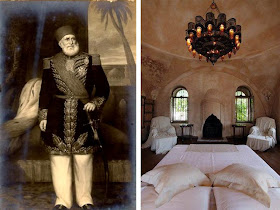For centuries Egypt has been the owner of an intriguing piece of real-estate in the Greek port city of Kavala. Forgotten by time it recently reemerged as a stunning boutique hotel with grand aspirations to transform Europe’s relationship with the Middle East. The Polyglot investigates.
 In 1799 Mohamed Ali, a 30-year old army general born in Kavala, Greece (then Macedonia), was sent to Egypt by the Ottoman Sultan to drive out Napoleon's forces. He would go on to be known as the "founder of modern Egypt," establishing a dynasty that would rule Egypt and the Sudan from 1805 to 1952.
In 1799 Mohamed Ali, a 30-year old army general born in Kavala, Greece (then Macedonia), was sent to Egypt by the Ottoman Sultan to drive out Napoleon's forces. He would go on to be known as the "founder of modern Egypt," establishing a dynasty that would rule Egypt and the Sudan from 1805 to 1952.
Many years later, he would donate a masterpiece of late Ottoman architecture to the people of Kavala as a gift to his birthplace. Named "Imaret," the stunning edifice was built from 1817-1821 and included a public kitchen, two Islamic schools, a private mosque and administrative offices.
 But with the withdrawal of the Turkish army after WW1 this oriental anomaly laid in disrepair for the next 80 years; forsaken by Egypt, which owns it, and neglected by the Greek government; looking to forget the occupation.
But with the withdrawal of the Turkish army after WW1 this oriental anomaly laid in disrepair for the next 80 years; forsaken by Egypt, which owns it, and neglected by the Greek government; looking to forget the occupation.
For decades Anna Missirian watched it lie in neglect, dreaming of someday transforming the sleeping beauty into a vibrant part of the community once again. Years later Anna, a native of Kavala and a sea captain's daughter who married into Greece's richest tobacco family, would make that dream come true. After negotiations which lasted some seven years, she managed to secure a fifty-year lease on Imaret from the Egyptian government. In 2004, after a 22 month restoration, Imaret reemerged as the first boutique hotel in Greece to be housed in a historic building.
 Prominently positioned amongst the old town’s winding cobble stoned streets, today Imaret is Kavala's most notable landmark with its multiple archways crowned by more than 100 domes. The impeccable restoration included the mosque with Mohamed Ali's prayer balcony and a stunning candlelit swimming pool located in a cistern beneath a sea of domed ceilings.
Prominently positioned amongst the old town’s winding cobble stoned streets, today Imaret is Kavala's most notable landmark with its multiple archways crowned by more than 100 domes. The impeccable restoration included the mosque with Mohamed Ali's prayer balcony and a stunning candlelit swimming pool located in a cistern beneath a sea of domed ceilings.
The 30 luxuriously appointed rooms resemble Byzantine chapels, with sunlight filtering through skylights in exposed-stone domes. Egyptian chandeliers hang over giant beds draped in emerald brocades, while antique kilims cover the stone floors. The bathrooms are no less spectacular with sunken marble baths and beaten-cooper sinks. On the hotel’s terrace, with its impressive views of the Aegean, Greek-Oriental cuisine created by chef Georgia Nikopoulou (poached from the Sani Asterias Suites in Halkidiki), is served with the finest Macedonian wines.
 Yet Imaret is only the beginning of Anna Missirian’s plan to transform Kavala into a platform onto which a dialogue between Eastern and Western civilizations can develop; strengthening ties between Europe and Egypt, and spreading a better understanding of Islam and the Arab World throughout the continent. In 2006, the Cairo Opera Symphony Orchestra was invited in Kavala to provide the very first Egyptian cultural presence in the city in contemporary times. Not surprisingly there are two more monuments close to Imaret also owned by Egypt: a great statue of Mohamed Ali on horseback, as well as the grand mansion he built for his family; also fully restored by Missirian.
Yet Imaret is only the beginning of Anna Missirian’s plan to transform Kavala into a platform onto which a dialogue between Eastern and Western civilizations can develop; strengthening ties between Europe and Egypt, and spreading a better understanding of Islam and the Arab World throughout the continent. In 2006, the Cairo Opera Symphony Orchestra was invited in Kavala to provide the very first Egyptian cultural presence in the city in contemporary times. Not surprisingly there are two more monuments close to Imaret also owned by Egypt: a great statue of Mohamed Ali on horseback, as well as the grand mansion he built for his family; also fully restored by Missirian.
Missirian's hope is to use the long lease of Imaret to transform the current hotel facility into a school for Middle Eastern studies. To achieve this, she founded the Institute of Mohamed Ali for Research in Eastern Tradition. Negotiations are currently underway with the Egyptian government to turn Imaret into a cultural bridge between East and West.
 In 1799 Mohamed Ali, a 30-year old army general born in Kavala, Greece (then Macedonia), was sent to Egypt by the Ottoman Sultan to drive out Napoleon's forces. He would go on to be known as the "founder of modern Egypt," establishing a dynasty that would rule Egypt and the Sudan from 1805 to 1952.
In 1799 Mohamed Ali, a 30-year old army general born in Kavala, Greece (then Macedonia), was sent to Egypt by the Ottoman Sultan to drive out Napoleon's forces. He would go on to be known as the "founder of modern Egypt," establishing a dynasty that would rule Egypt and the Sudan from 1805 to 1952. Many years later, he would donate a masterpiece of late Ottoman architecture to the people of Kavala as a gift to his birthplace. Named "Imaret," the stunning edifice was built from 1817-1821 and included a public kitchen, two Islamic schools, a private mosque and administrative offices.
 But with the withdrawal of the Turkish army after WW1 this oriental anomaly laid in disrepair for the next 80 years; forsaken by Egypt, which owns it, and neglected by the Greek government; looking to forget the occupation.
But with the withdrawal of the Turkish army after WW1 this oriental anomaly laid in disrepair for the next 80 years; forsaken by Egypt, which owns it, and neglected by the Greek government; looking to forget the occupation.For decades Anna Missirian watched it lie in neglect, dreaming of someday transforming the sleeping beauty into a vibrant part of the community once again. Years later Anna, a native of Kavala and a sea captain's daughter who married into Greece's richest tobacco family, would make that dream come true. After negotiations which lasted some seven years, she managed to secure a fifty-year lease on Imaret from the Egyptian government. In 2004, after a 22 month restoration, Imaret reemerged as the first boutique hotel in Greece to be housed in a historic building.
 Prominently positioned amongst the old town’s winding cobble stoned streets, today Imaret is Kavala's most notable landmark with its multiple archways crowned by more than 100 domes. The impeccable restoration included the mosque with Mohamed Ali's prayer balcony and a stunning candlelit swimming pool located in a cistern beneath a sea of domed ceilings.
Prominently positioned amongst the old town’s winding cobble stoned streets, today Imaret is Kavala's most notable landmark with its multiple archways crowned by more than 100 domes. The impeccable restoration included the mosque with Mohamed Ali's prayer balcony and a stunning candlelit swimming pool located in a cistern beneath a sea of domed ceilings.The 30 luxuriously appointed rooms resemble Byzantine chapels, with sunlight filtering through skylights in exposed-stone domes. Egyptian chandeliers hang over giant beds draped in emerald brocades, while antique kilims cover the stone floors. The bathrooms are no less spectacular with sunken marble baths and beaten-cooper sinks. On the hotel’s terrace, with its impressive views of the Aegean, Greek-Oriental cuisine created by chef Georgia Nikopoulou (poached from the Sani Asterias Suites in Halkidiki), is served with the finest Macedonian wines.
 Yet Imaret is only the beginning of Anna Missirian’s plan to transform Kavala into a platform onto which a dialogue between Eastern and Western civilizations can develop; strengthening ties between Europe and Egypt, and spreading a better understanding of Islam and the Arab World throughout the continent. In 2006, the Cairo Opera Symphony Orchestra was invited in Kavala to provide the very first Egyptian cultural presence in the city in contemporary times. Not surprisingly there are two more monuments close to Imaret also owned by Egypt: a great statue of Mohamed Ali on horseback, as well as the grand mansion he built for his family; also fully restored by Missirian.
Yet Imaret is only the beginning of Anna Missirian’s plan to transform Kavala into a platform onto which a dialogue between Eastern and Western civilizations can develop; strengthening ties between Europe and Egypt, and spreading a better understanding of Islam and the Arab World throughout the continent. In 2006, the Cairo Opera Symphony Orchestra was invited in Kavala to provide the very first Egyptian cultural presence in the city in contemporary times. Not surprisingly there are two more monuments close to Imaret also owned by Egypt: a great statue of Mohamed Ali on horseback, as well as the grand mansion he built for his family; also fully restored by Missirian.Missirian's hope is to use the long lease of Imaret to transform the current hotel facility into a school for Middle Eastern studies. To achieve this, she founded the Institute of Mohamed Ali for Research in Eastern Tradition. Negotiations are currently underway with the Egyptian government to turn Imaret into a cultural bridge between East and West.


No comments:
Post a Comment